Special Report
Add These Disease-Fighting Foods to Your Diet to Live a Longer Life

Published:

Perhaps the saying, “Live long and prosper” should be changed to “Eat right and live longer.” More and more scientific research is finding that what we put into our mouths every day has a profound effect on our longevity and ability to fight diseases.
In particular, many fruits and vegetables act as anti-inflammatory agents. Why is that important? Because inflammation can be a major cause of chronic diseases, among them arthritis and diabetes. When you fight inflammation, you can fight off those diseases, or at least possibly reduce any inflammatory pain. (See these easy ways to boost your immune system.)
To compile a list of 25 foods with disease-fighting properties, 24/7 Tempo consulted registered dietitians and nutritionists, reviewed several studies on so-called superfoods (often marketed as having numerous health benefits), and consulted online sources, including the National Institutes of Health, the National Cancer Institute, and the Mayo Clinic.
In addition to their anti-inflammatory properties, the foods on our list also contain antioxidants. Antioxidants fight cell damage caused by free radicals roaming the body. Given the chance to invade our cells, free radicals can lead to cancer and even Alzheimer’s disease. For instance, one study found the phytochemicals and antioxidants in avocados protected against neuron damage to the brain, a sign of Alzheimer’s.
You can lower your risk of heart disease and hypertension with your diet, too. High-fiber fruits, grains, and vegetables – like kiwis, barley, and kale – are a great way to lower cholesterol. (See these other healthy eating habits that will change your life.)
Click here to see disease-fighting foods to add to your diet to live a longer life
It should be noted that while some studies definitely say these foods are disease-fighting heroes, other researchers are not so sure. Either way, you won’t lose out by indulging in these delicious, healthful foods.
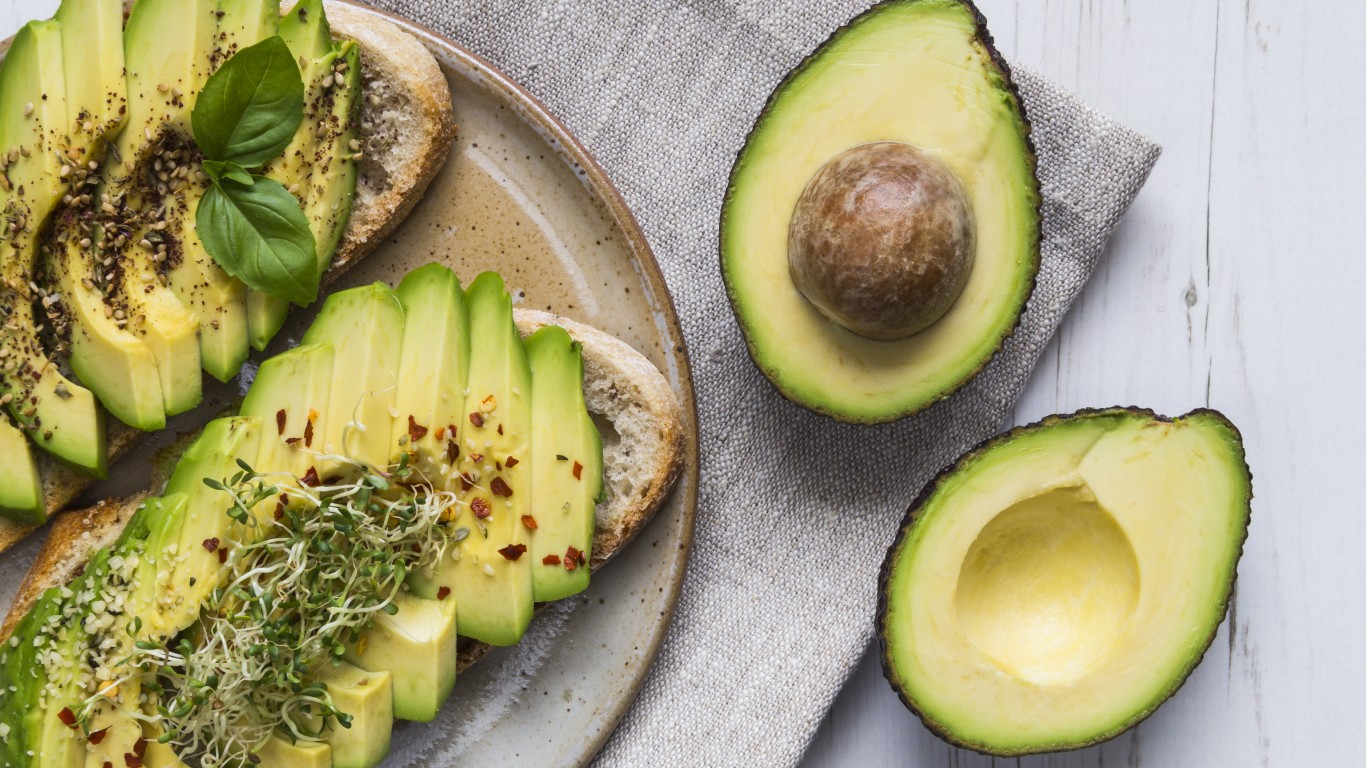
Avocado
> Helps fight or reduce the risk of: Alzheimer’s disease
Known for their smooth texture and creamy taste, avocados are packed with phytochemicals and antioxidants that scientists believe can protect against brain disorders, including Alzheimer’s disease. Specifically, the antioxidants combat oxidative stress that can damage the neurons of the brain. That view was supported by a 2021 study of 2,886 participants published in Frontiers in Nutrition, showing that those who ate avocados scored higher on cognitive performance than those who didn’t. Avocados are also high in folate, a nutrient that can prevent formation of Alzheimer-causing brain tangles.
[in-text-ad]
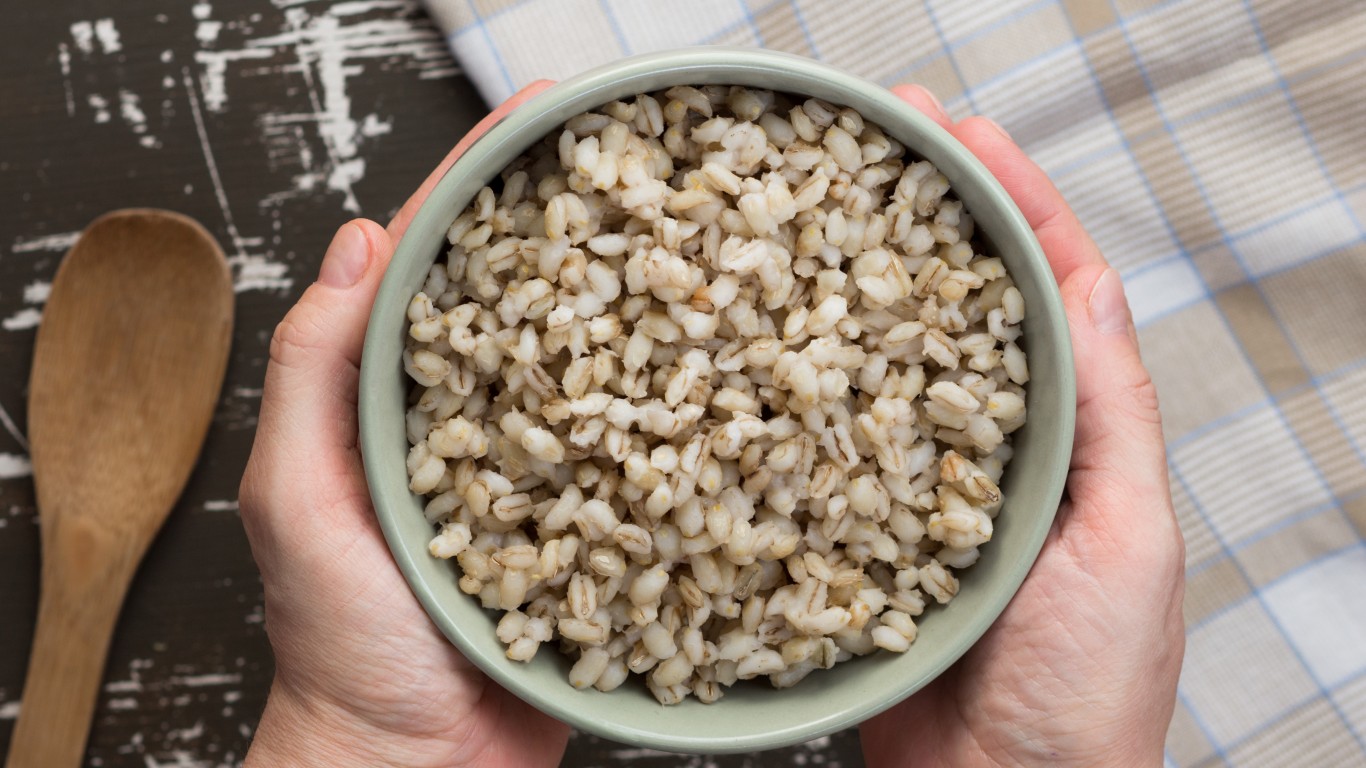
Barley
> Helps fight or reduce the risk of: Cholesterol, hypertension
Research has found that this cereal grain may help lower cholesterol and reduce blood pressure. The dietary fibers in barley, which also keep people full longer, may also lower the risk for developing diabetes by reducing blood sugar levels. Barley also contains protein, vitamins B and E, flavonoids, and the minerals selenium, magnesium, iron, and copper.
Berries
> Help fight or reduce the risk of: Cancer
Blueberries, raspberries, strawberries, blackberries – all are loaded with antioxidants that can help counteract the oxidative stress caused by free radicals, which can trigger diseases. “Stick with food forms of antioxidants and stay away from the supplements as high doses can be harmful and some interact with certain medications,” advises Kayla Fitzgerald, a registered dietitian and nutritionist at Nutrition Rites, a nutrition counseling center in Charleston, South Carolina. Plus, she adds, berries are much tastier than a supplement and you’ll get the added bonus of fiber. “One cup of blackberries provides 8 grams of fiber.” That’s about a third of the recommended amount of fiber for the day.
Cantaloupe
> Helps fight or reduce the risk of: Hypertension
In addition to their sweet flavor, cantaloupes pack a punch in the fight against hypertension. Loaded with potassium, the melon counteracts the harmful effects of sodium by lowering blood pressure and relaxing the blood vessel walls. With 800 to 900 milligrams of potassium, one cantaloupe provides 20% of the daily recommended value for that nutrient, making it a valuable ingredient in a heart-healthy diet.
[in-text-ad-2]
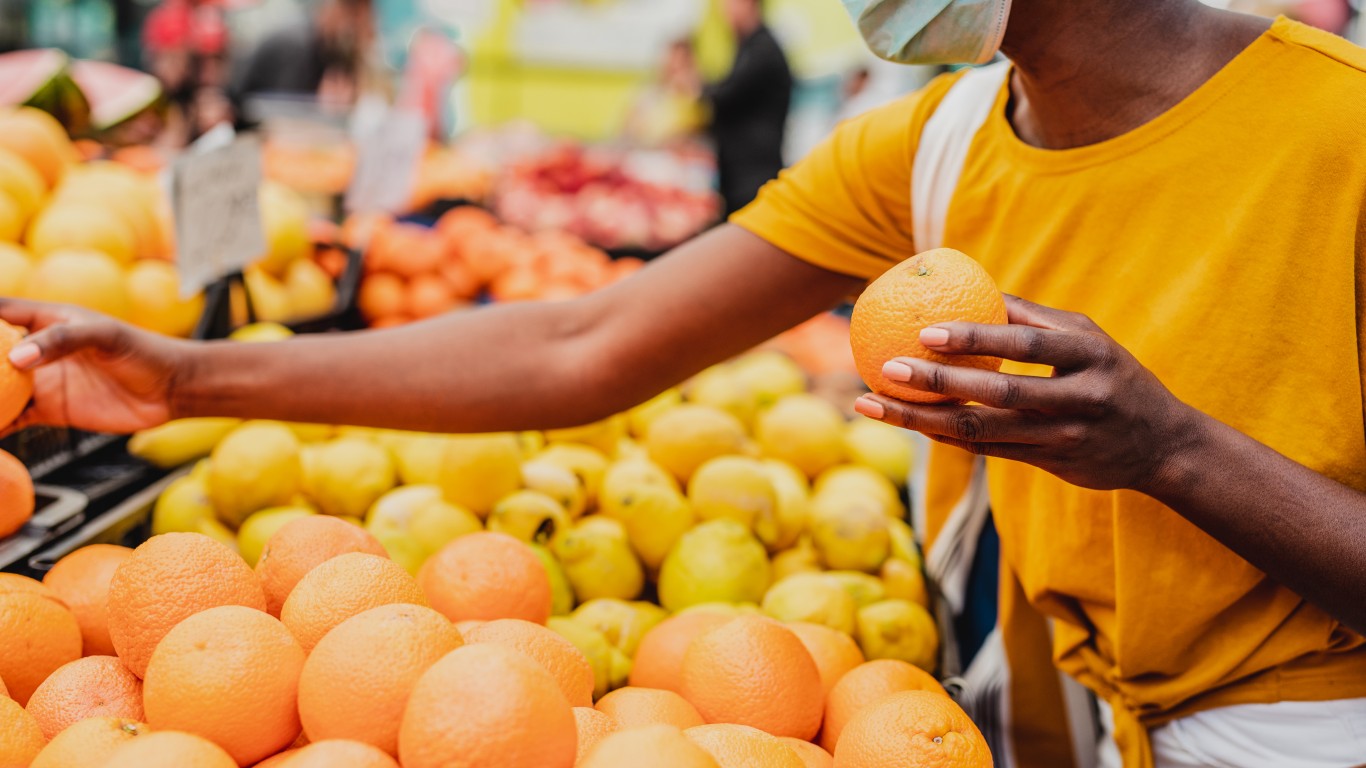
Citrus fruits
> Help fight or reduce the risk of: Cancer, diabetes, and neurological disease
Citrus fruits such as oranges, grapefruits, lemons, and limes don’t offer just one healthful nutrient – they offer three: vitamin C, flavonoids, and fiber. Vitamin C strengthens blood vessels and connective tissue, while flavonoids fight cell damage caused by free radicals. Dietary fiber can lower cholesterol and therefore reduce the risk of cardiovascular disease. One study in Japan found those who consumed citrus fruits and juices lowered their risk of cancer. Another study reported that a diet of mostly citrus fruits can prevent obesity, which can in turn lower the rates of diabetes.
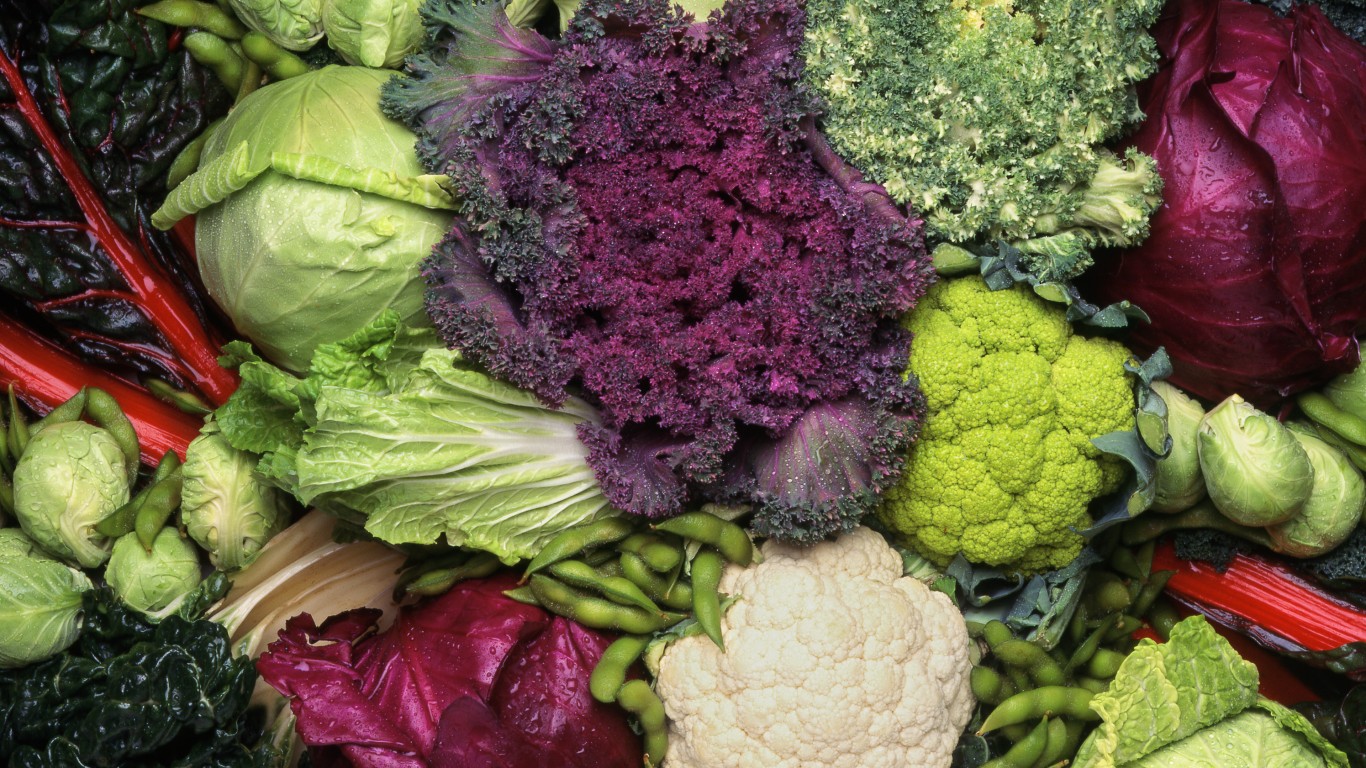
Cruciferous veggies
> Help fight or reduce the risk of: Cancer
Broccoli, brussels sprouts, kale, cauliflower, cabbage, and turnips belong to the cruciferous vegetable family. In addition to vitamins C, E, and K and folate and other minerals, cruciferous vegetables contain glucosinolates, a group of chemicals that break down into biologically active compounds including indoles and isothiocyanates when digested. Researchers believe indoles and isothiocyanates can help in the fight against certain cancers, including breast, lung, liver, and prostate.
[in-text-ad]
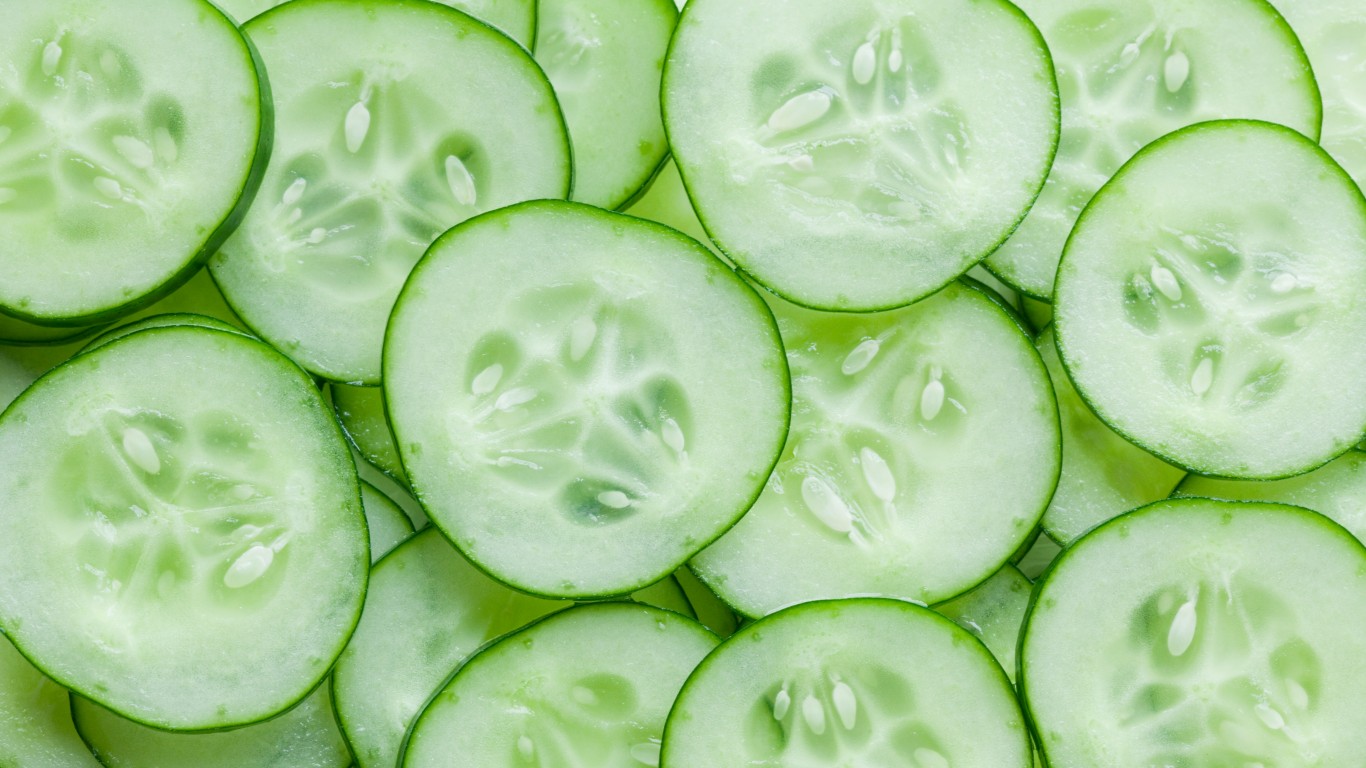
Cucumber
> Helps fight or reduce the risk of: Sunburn
Cucumbers are made of 96% water, making the vegetables a great way to hydrate your skin after a sunburn. Cucumbers are also a good source of vitamin C and have antioxidant and analgesic properties. They contain no harsh irritants. To make a cooling cucumber smoothie, blend chilled cucumbers in a blender and apply to your skin.

Dark chocolate
> Helps fight or reduce the risk of: Cardiovascular disease and certain cancers
Dark chocolate provides more than just a sweet treat. It’s packed with flavonoids and antioxidants, both of which fight free radicals. Free radicals in the body have been linked to heart disease and cancers. Plus, antioxidants can help lower “bad” cholesterol. However, dark chocolate is high in calories and saturated fat, so indulge in moderation.
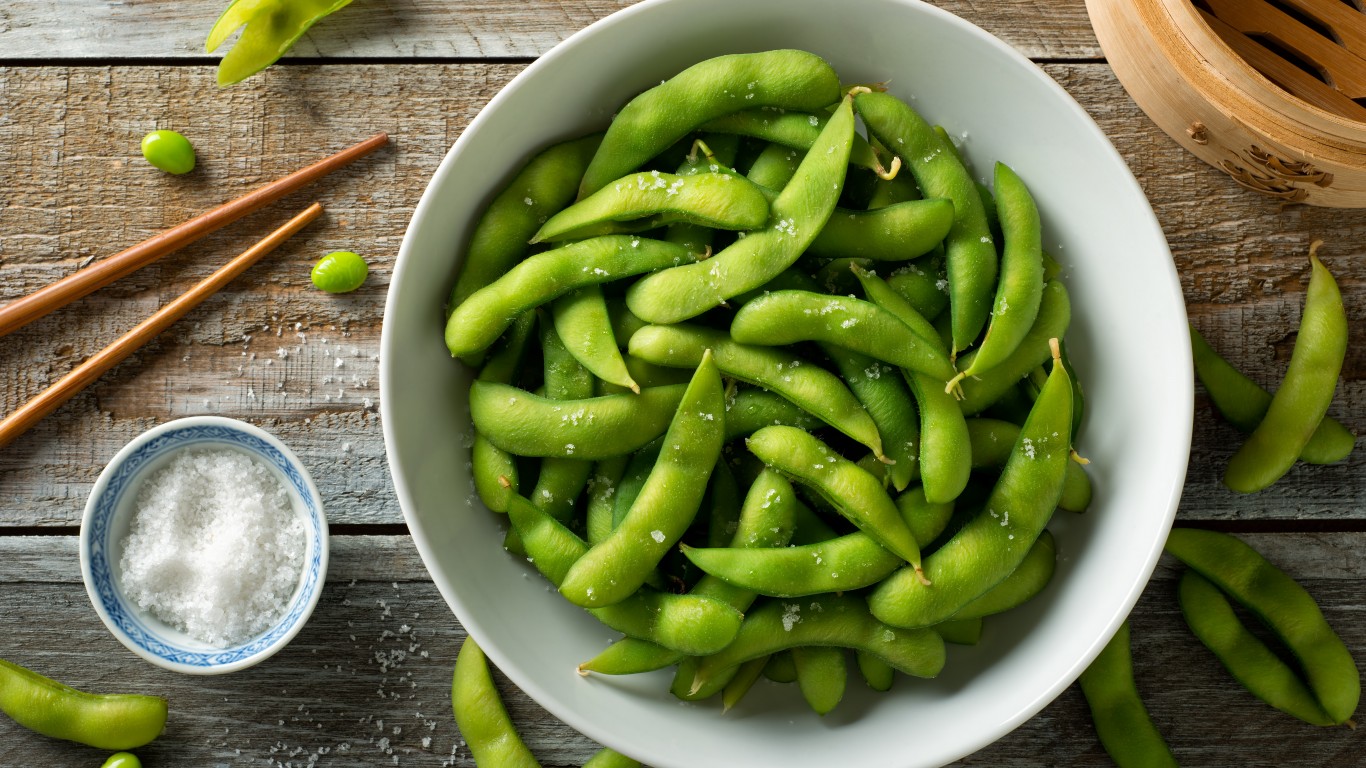
Edamame
> Helps fight or reduce the risk of: Breast cancer
Edamame are whole, immature soybeans. Although considered healthy, soy was for many years wrongly believed to be a risk factor for breast cancer. That’s because soy contains isoflavones, which act like estrogen in the body. Too much estrogen has been linked to certain types of breast cancer. Yet those myths were based on animal, not human, studies. In human studies, soy has been found to have no or little effect. In fact, one study of 73,000 Chinese women revealed those who consumed 13 grams of soy protein a day were 11% less likely to develop breast cancer than those who ate less than 5 grams.
[in-text-ad-2]
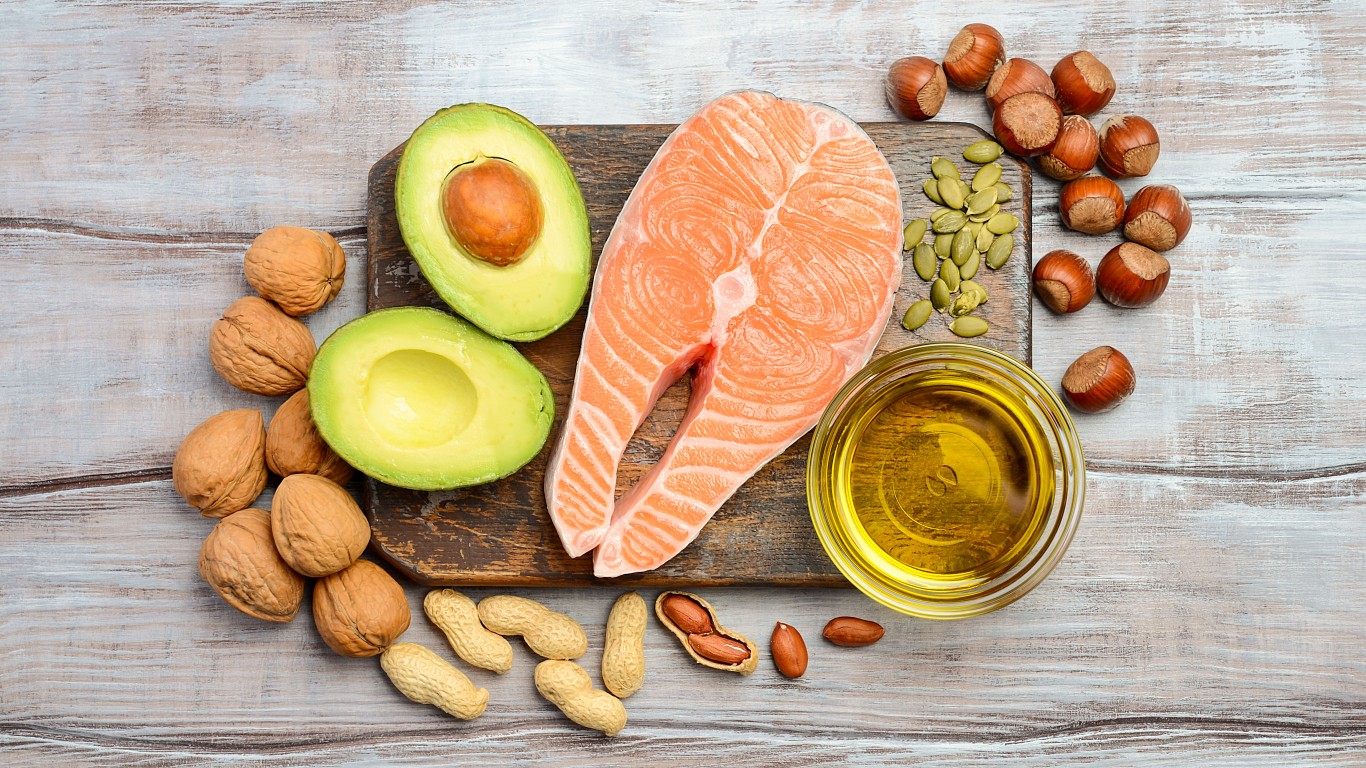
Fatty fish
> Helps fight or reduce the risk of: Heart disease
Fatty fish are high in omega-3 fatty acids, which is a common deficiency, according to Fitzgerald. “If you’re looking to make some realistic changes to your eating habits, try setting a goal of eating fish at least two times each week.” Herring and salmon, which are high in omega-3 fatty acids, can benefit everything from your brain health to your heart health, says Amy Gorin, MS, RDN, owner of Amy Gorin Nutrition in the New York City area. Other fish rich in omega-3s include anchovies, mackerel, sardines, bluefin tuna, and striped bass.
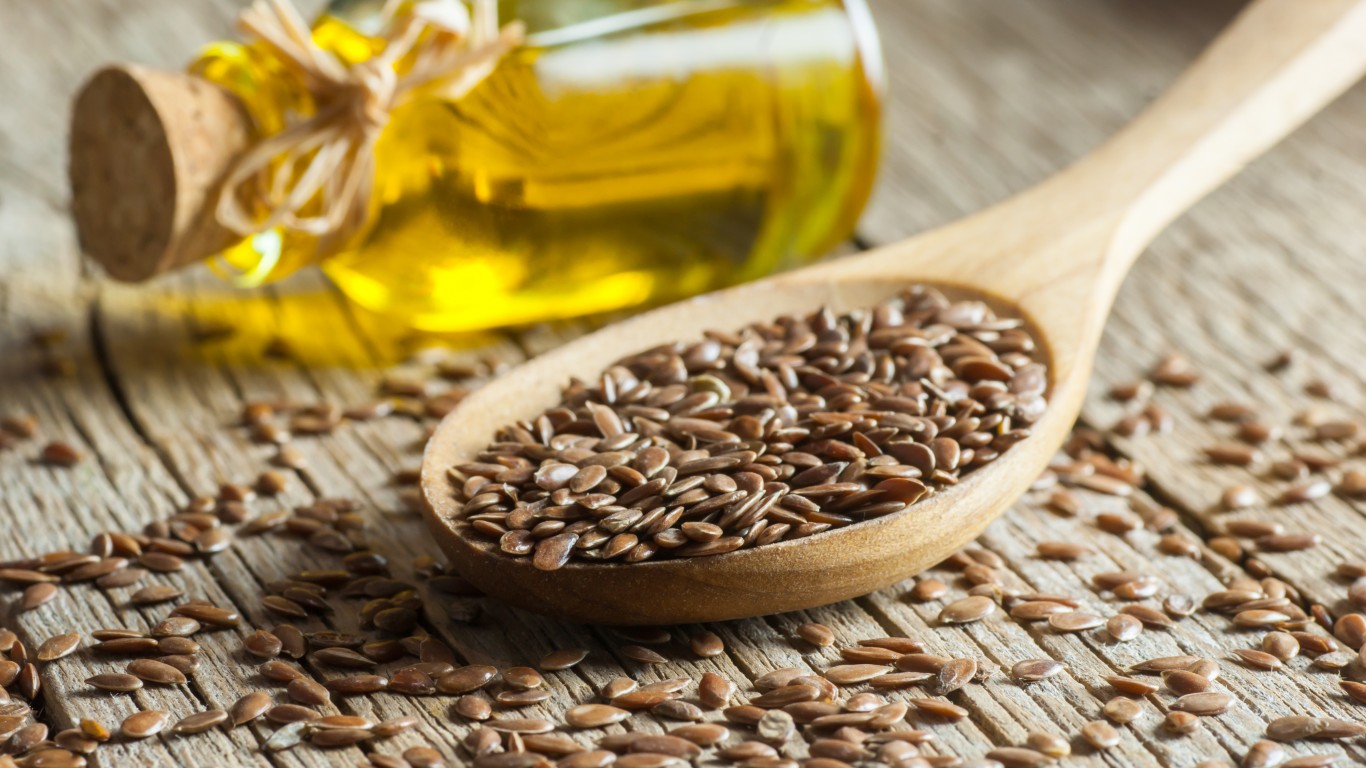
Flaxseed
> Helps fight or reduce the risk of: Breast cancer
Flaxseed is also classified as an omega-3 fatty acid. Several studies have indicated consuming 25 grams of flaxseed daily can inhibit breast cancer tumor growth. However, other researchers say more research is needed to determine if flaxseed is effective in treatment of the cancer. What is known is that flaxseed can reduce estrogen production, which may reduce the risk of breast cancer. Flaxseed can also boost the effects of tamoxifen, a drug prescribed to prevent breast cancer recurrence.
[in-text-ad]
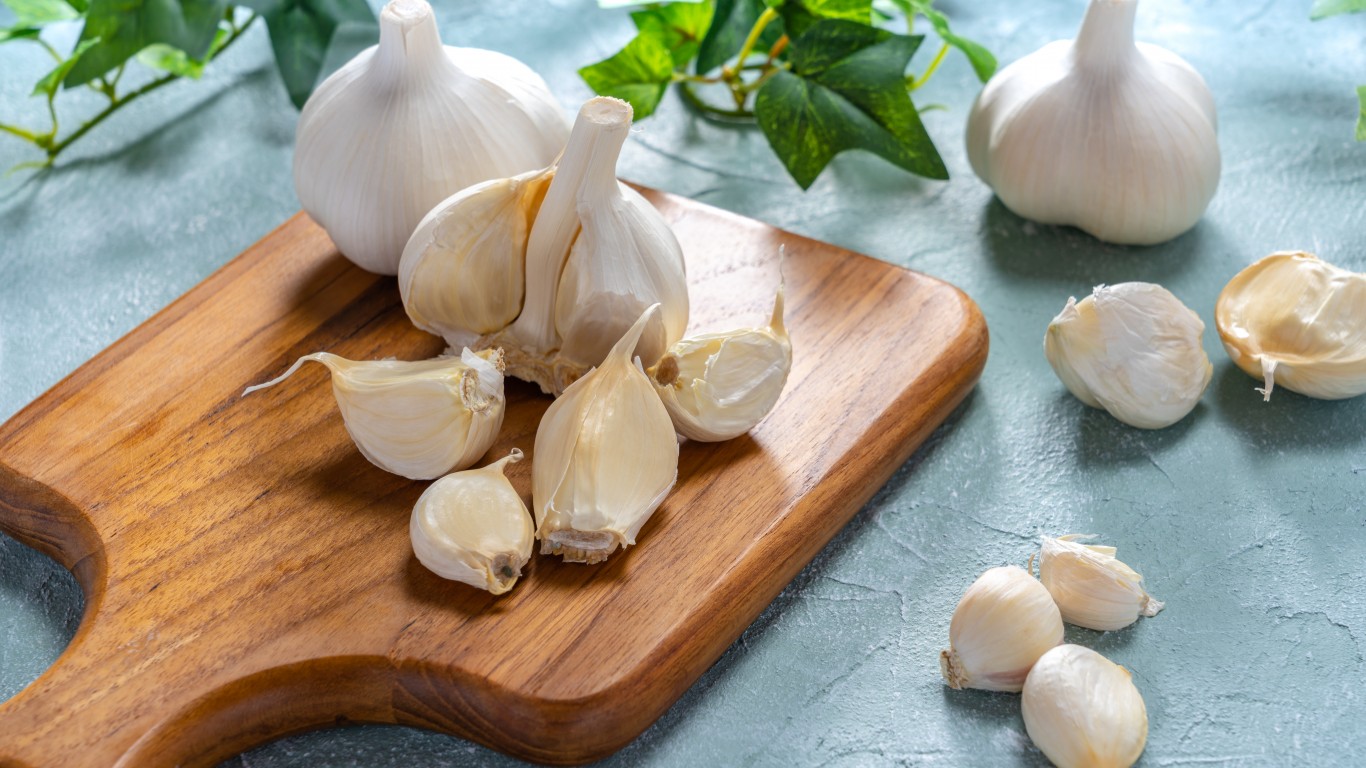
Garlic
> Helps fight or reduce the risk of: Stress
Looking for a way to lower stress? Instead of meditation or yoga, try some garlic. Studies have found garlic extract contains antidepressant properties, mostly because it lowers the stress-related hormone, cortisol, in the body.
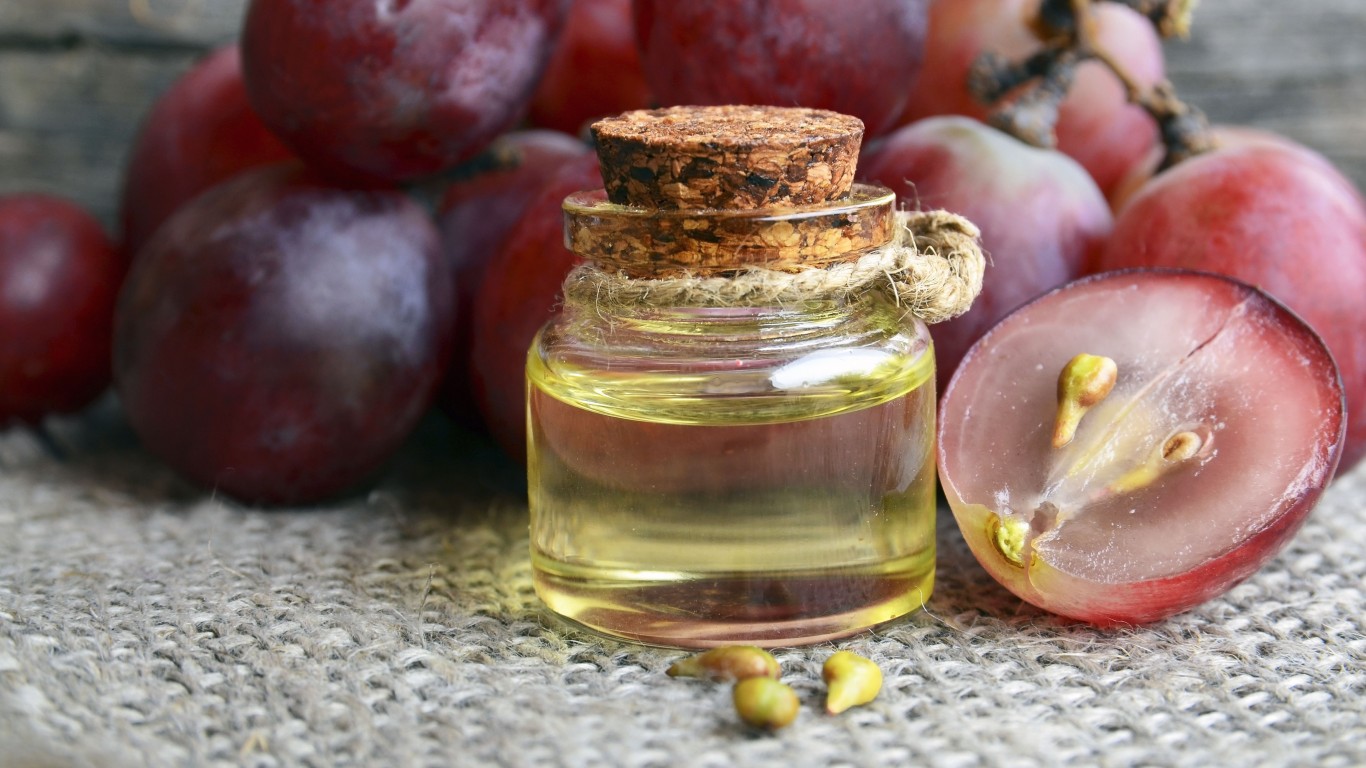
Grapeseed oil
> Helps fight or reduce the risk of: Alzheimer’s disease
A 2018 study published in the Journal of Neuroscience concluded that grapeseed oil reduced plaque formation in the brain of mice. The plaque is associated with the cognitive declines in Alzheimer’s disease patients. The specific compound in grape seed extract said to reduce plaque formation is polyphenol, which is also found in tea, wine, and cocoa.
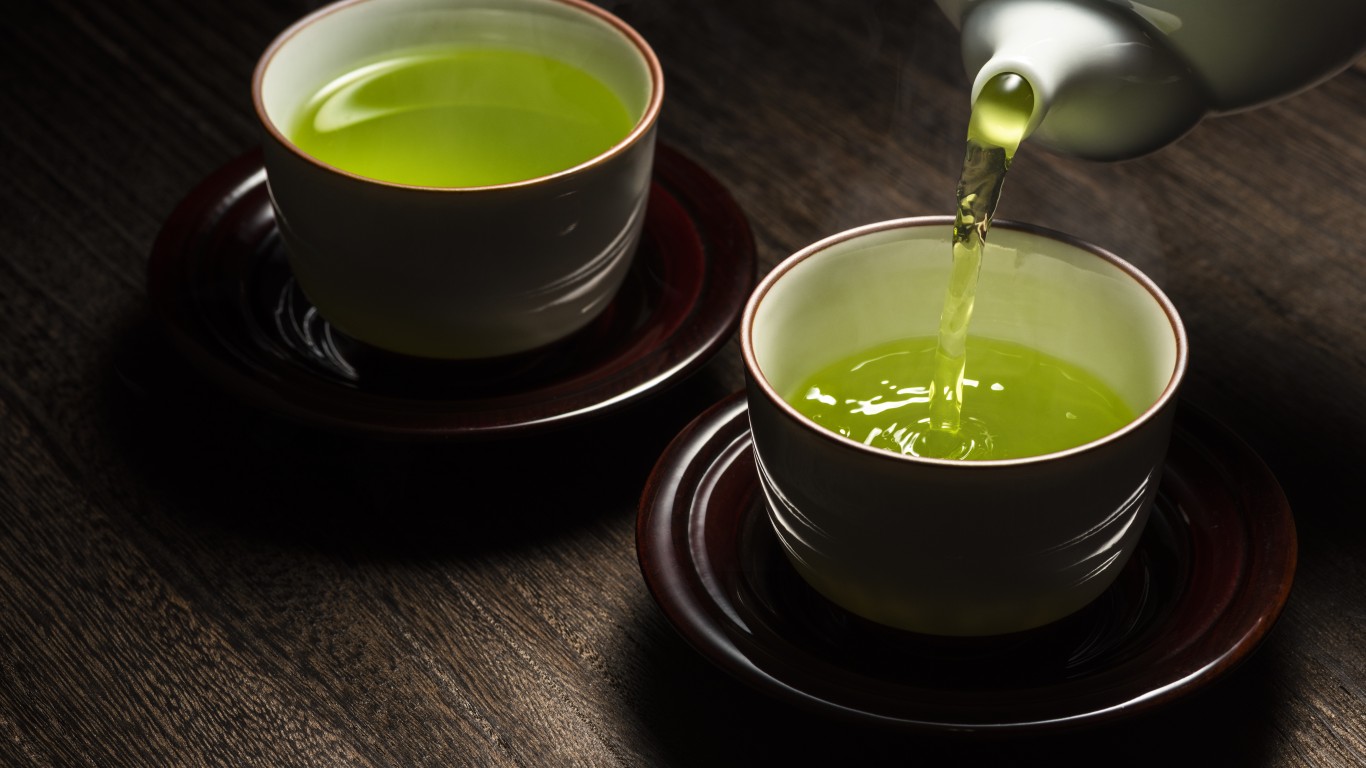
Green tea
> Helps fight or reduce the risk of: Inflammation, hypertension
This is a beverage that’s rich in healthy antioxidants, Gorin says. It helps improve blood circulation, lowers bad cholesterol, and prevents high blood pressure. Additionally, green tea may help with weight loss by helping to boost metabolism, she added. “And when you drink unsweetened green tea as a replacement for sugary beverages, this can help with both weight loss and hydration.”
[in-text-ad-2]
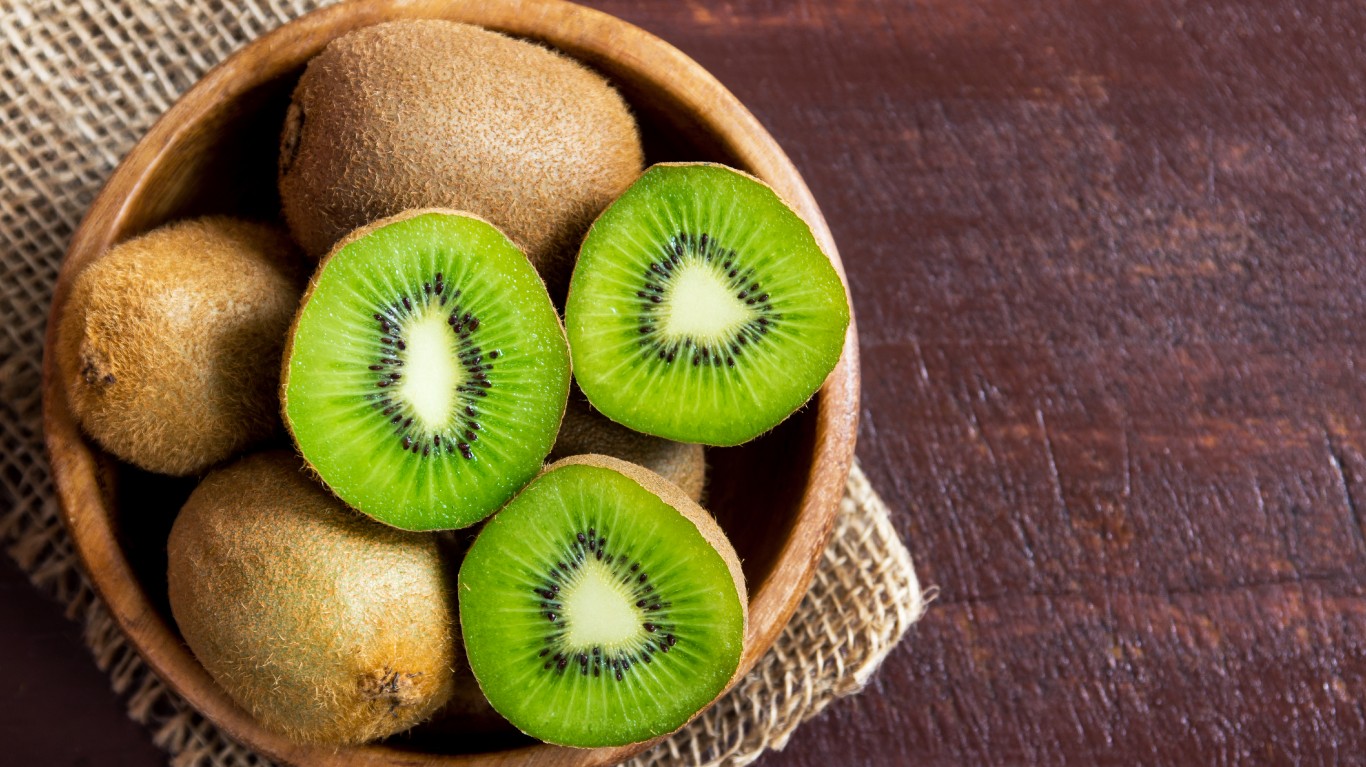
Kiwi fruit
> Helps fight or reduce the risk of: Cholesterol
Research has shown that kiwis help improve a person’s digestive, immune, and metabolic health. They are also rich in vitamin C. According to one study, the consumption of at least one kiwi a week helps lower LDL “bad” cholesterol and increase HDL “good” cholesterol levels. A separate study has suggested that eating kiwi, which contains serotonin, a hormone that plays a role in sleep regulation, may be beneficial for people with sleep disorders.
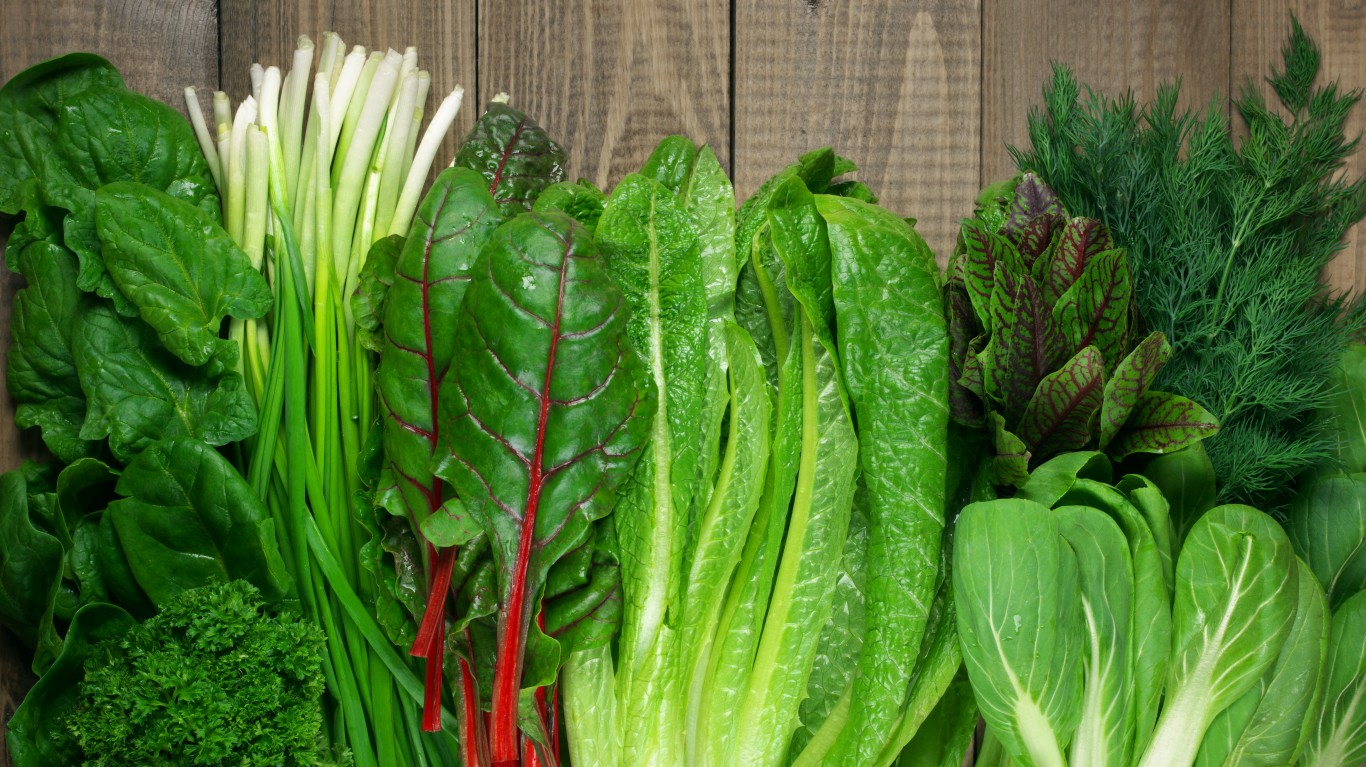
Leafy greens
> Help fight or reduce the risk of: Cholesterol, colon cancer, eye diseases
“Leafy greens are a great source of vitamin A and vitamin C,” Fitzgerald says. Many of them are also a good source of calcium, which is important for anyone avoiding dairy products. Calcium is crucial for healthy bones, teeth, heart health, and blood clotting. “Don’t get stuck on thinking you have to eat a salad to get your daily dose of greens,” she said. “If you’re not a big fan of raw greens, try throwing them in a smoothie, soup, or scrambled eggs.”
[in-text-ad]
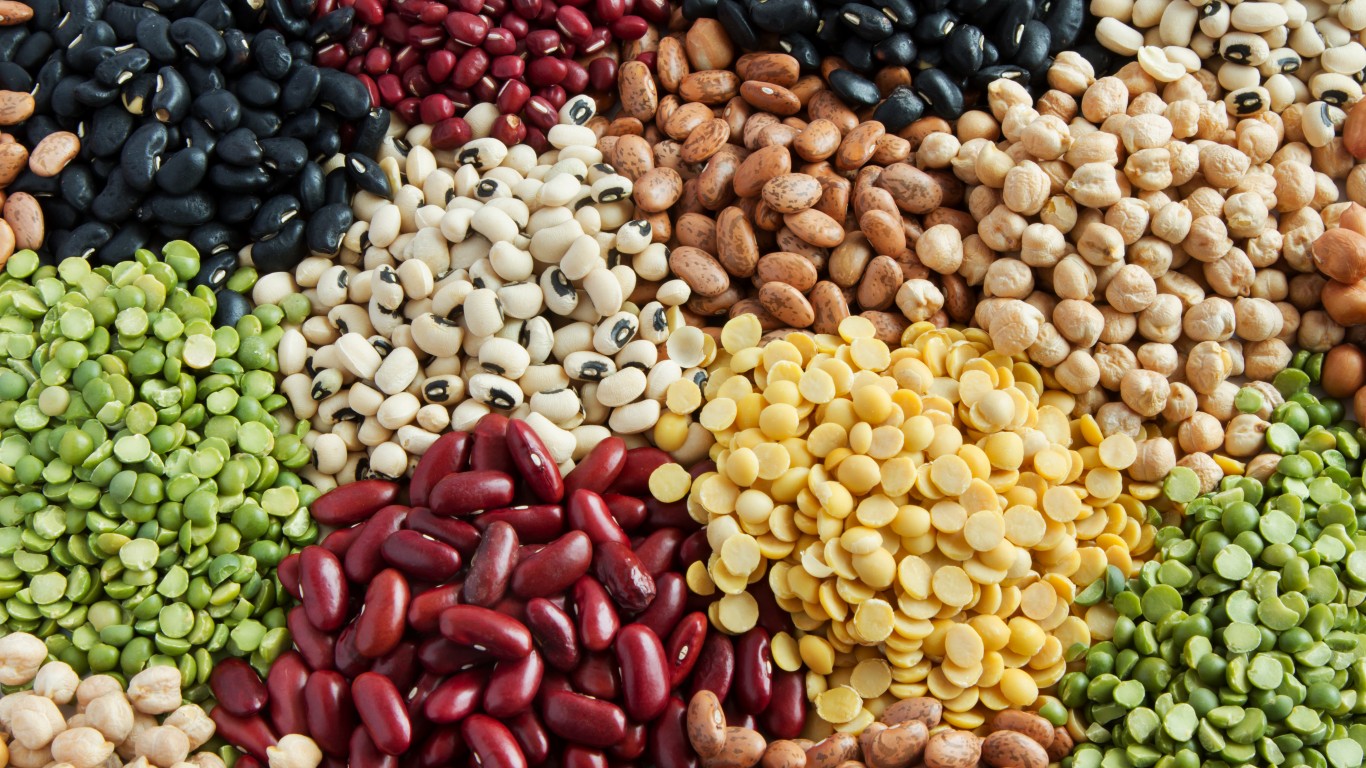
Legumes
> Helps fight or reduce the risk of: Certain cancers and heart disease
One way to reduce the risk of cancer is with a plant-based diet, and a plant-based diet includes healthy portions of legumes. Besides their nutritional benefits, legumes are rich in phytochemicals, or plant chemicals, that protect cells from damage. Although some studies conclude legumes can lower the risk of colorectal cancer, others studies are less conclusive. A plant-based diet is high in fiber, and some studies have suggested high-fiber diets lower the chance of breast and colorectal cancer.
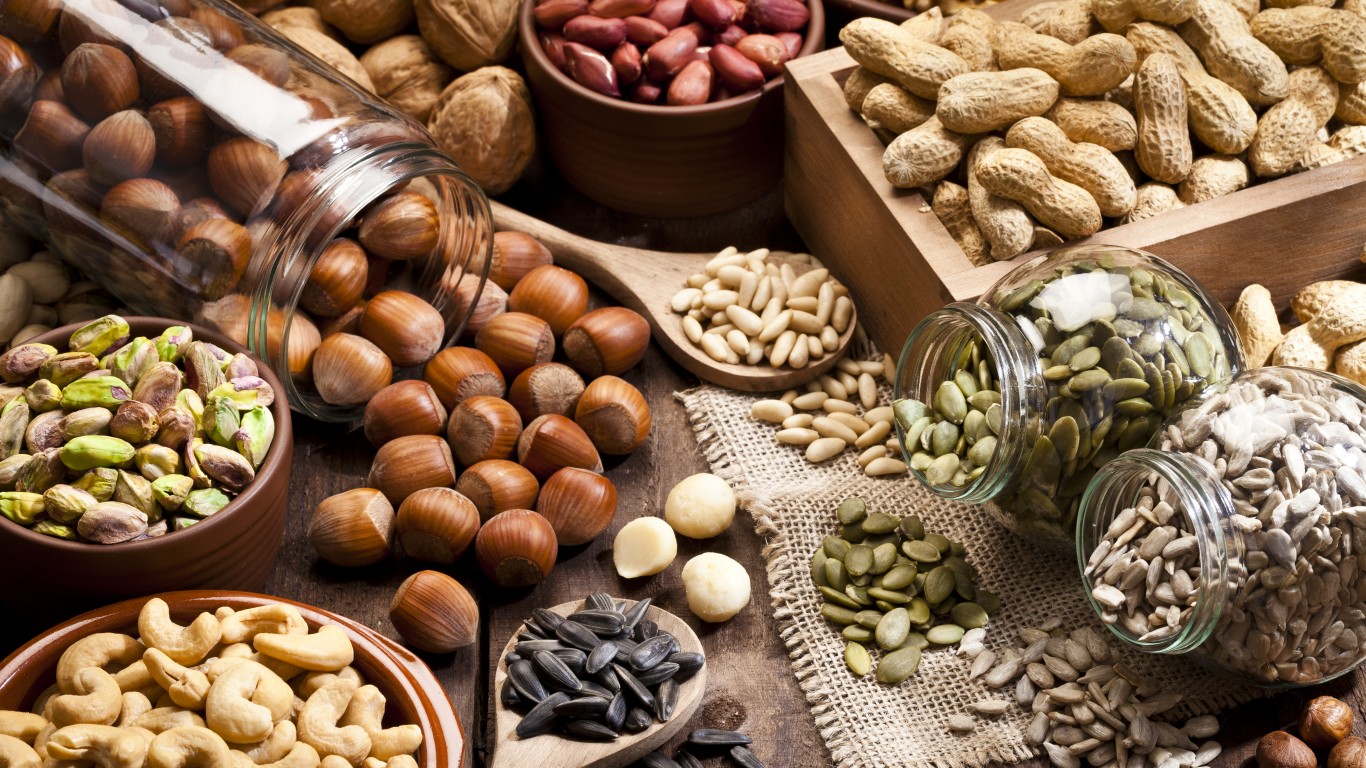
Nuts
> Help fight or reduce the risk of: Inflammation, arthritis
Your immune system kicks into gear when it perceives a foreign element, such as a microbe, entering the body. That triggers inflammation, a leading cause of many chronic diseases, including arthritis, diabetes, and heart disease. One way to tamp down inflammation is through diet, in particular, eating nuts like almonds and walnuts. Nuts contain a high amount of fiber, calcium, magnesium, zine, vitamin E, and omega-3 fats, all of which are anti-inflammatories. Anti-inflammatories can help reduce the pain of arthritis.
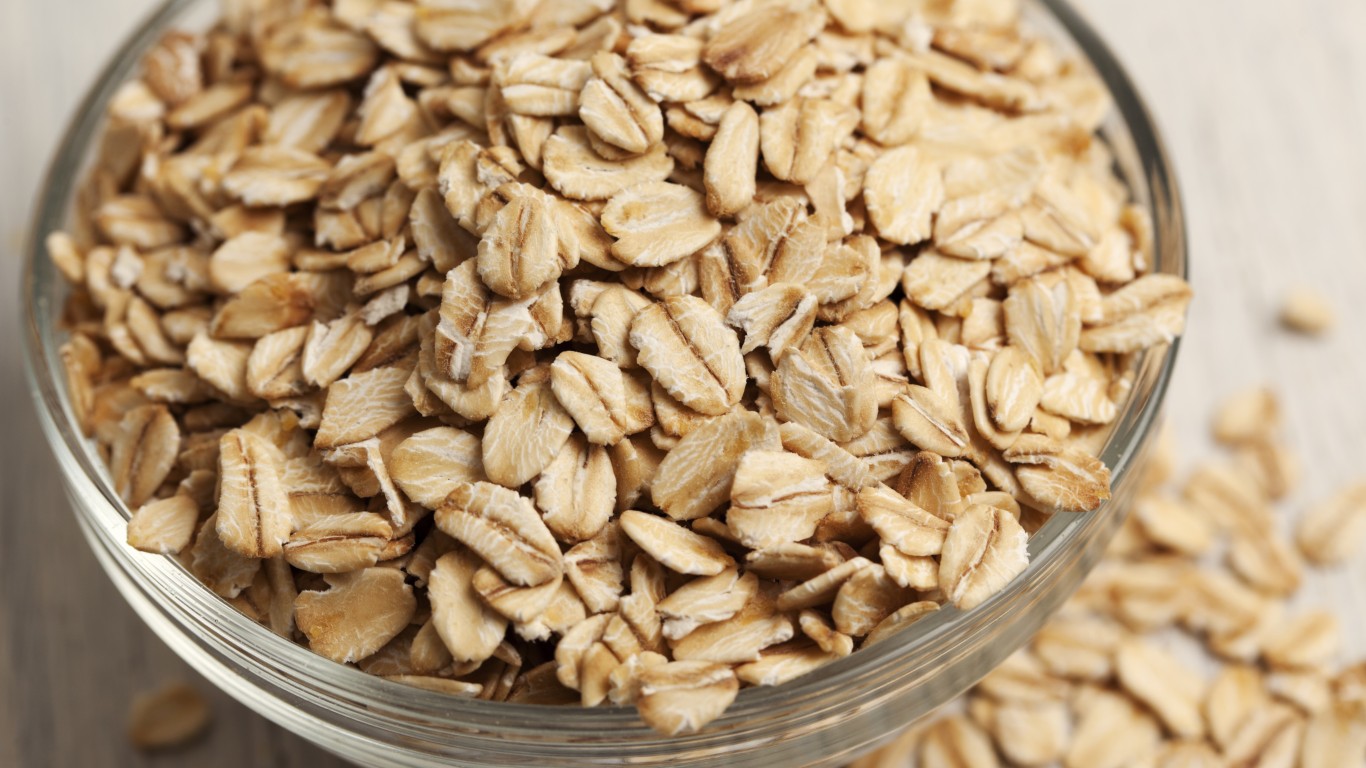
Oats
> Helps fight or reduce the risk of: Coronary heart disease
Americans don’t eat enough fiber. But they can close that gap with oats. Oatmeal lowers blood cholesterol, which can in turn prevent cholesterol from clogging our arteries – a major cause of heart disease. One study found that eating oats can prevent another heart attack after a patient suffered one cardiovascular event. Although a morning bowl of oatmeal is a great way to get your oats, you can have the nutrient anytime of day. Add oats to meatloaf, or coat chicken or fish with oats.
[in-text-ad-2]
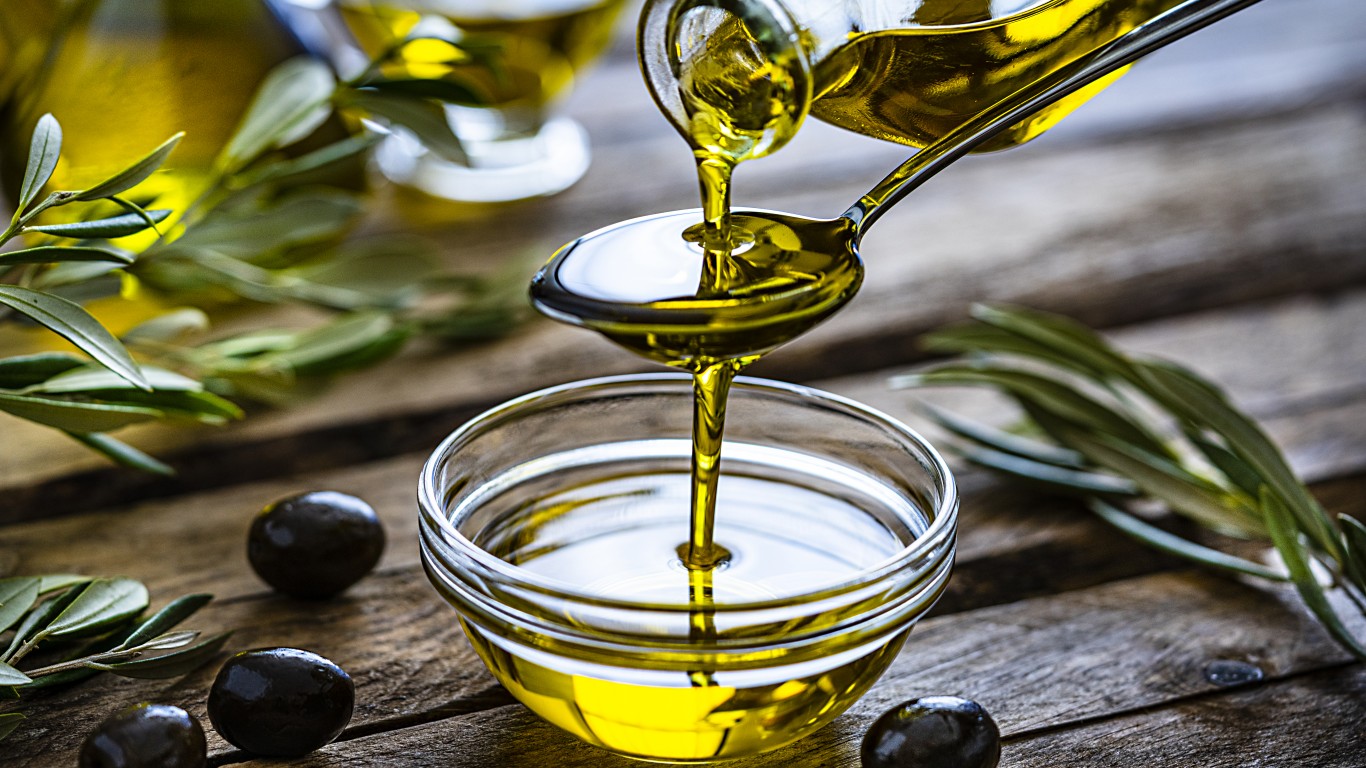
Olive oil
> Helps fight or reduce the risk of: Cardiovascular and neurodegenerative diseases
Research has shown that olive oil polyphenols, or micronutrients, may play a role in reducing morbidity and slowing down the progression of cardiovascular and neurodegenerative diseases, as well as some cancers. A study found that oleic acid, which is a main ingredient in olive oil, may help prevent cancer from forming in the brain by preventing cancerous genes from functioning in cells.
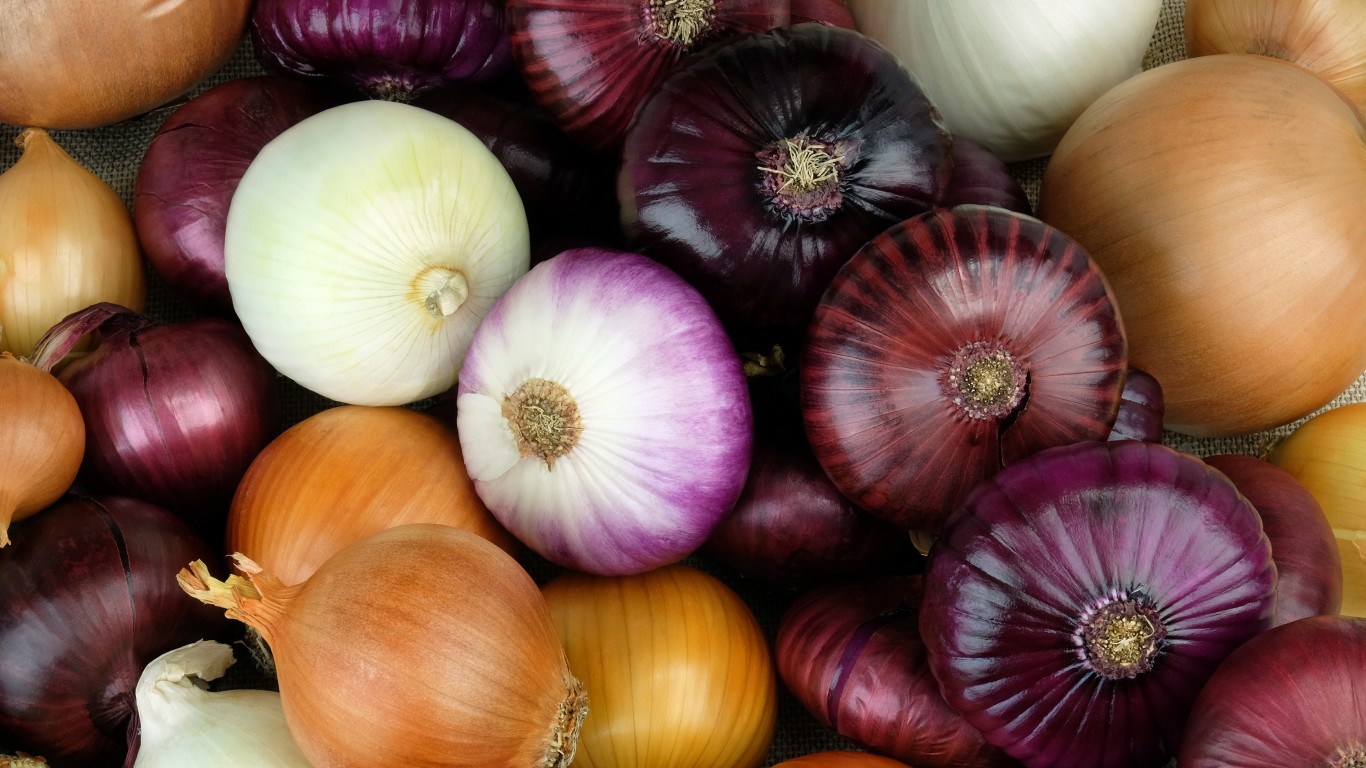
Onion
> Helps fight or reduce the risk of: Stomach cancer, hypertension
Onions contain a high concentration of quercetin, a flavonoid antioxidant that helps to lower blood pressure and cholesterol levels. The flavonoid antioxidant properties in allium vegetables like onions have also been shown to decrease the risk of stomach and colorectal cancer.
[in-text-ad]
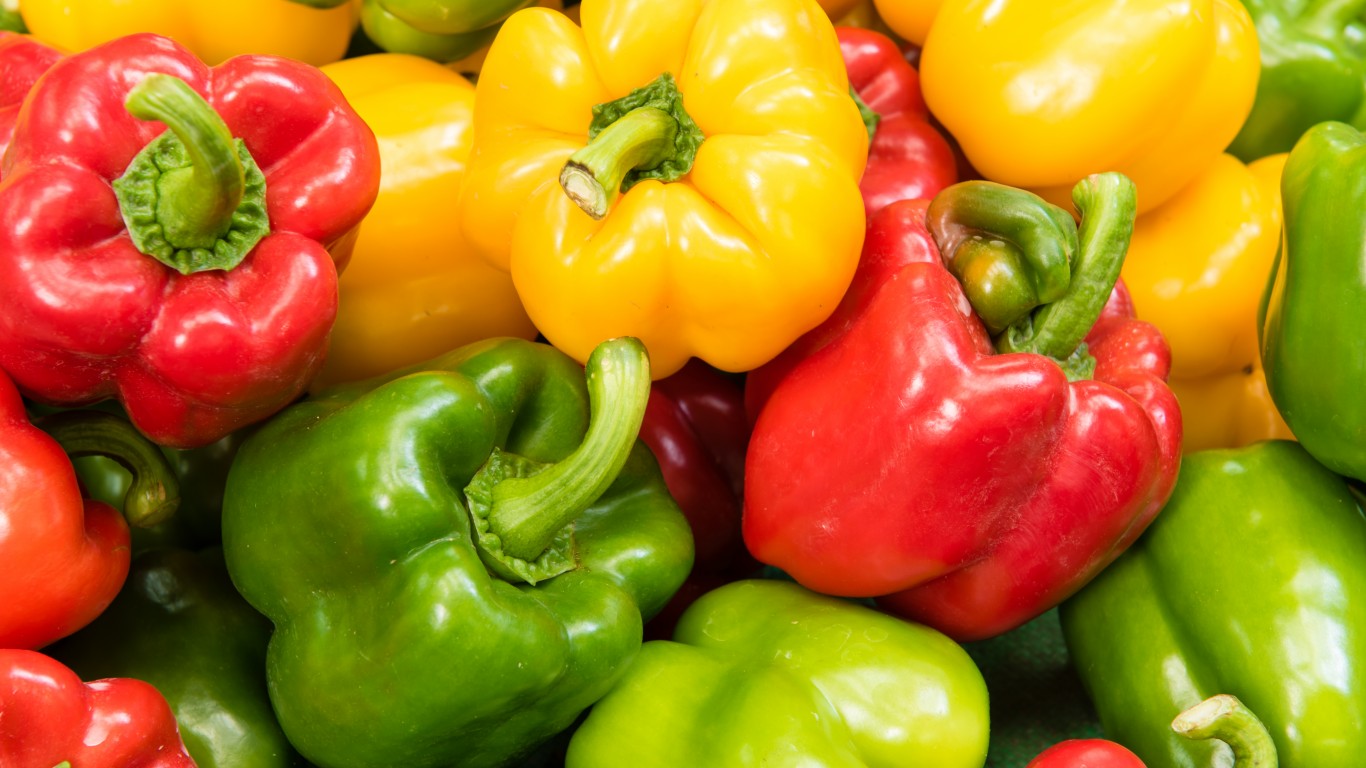
Peppers
> Help fight or reduce the risk of: Cancer, eye diseases
All bell peppers – green, orange, yellow, or red – are healthy. They are rich in Vitamin C, A, potassium, fiber, and folic acid – and they have few calories. The vegetables are well known for their high carotenoid content, which is what gives them different hues. Research has linked carotenoids to lower risks of some cancers and eye disease.

Pumpkin
> Helps fight or reduce the risk of: Diabetes, inflammation, cancer
Pumpkins are rich in alkaloids and flavonoids, which have anti-diabetic, anti-inflammatory, and anti-carcinogenic properties. The vegetable is also high in potassium, a mineral the body needs for muscles and kidney health, as well as for preventing heart palpitations. Pumpkins have a lot of enzymes that increase cell turnover, keeping the skin healthy and smooth, according to the International Dermal Institute.
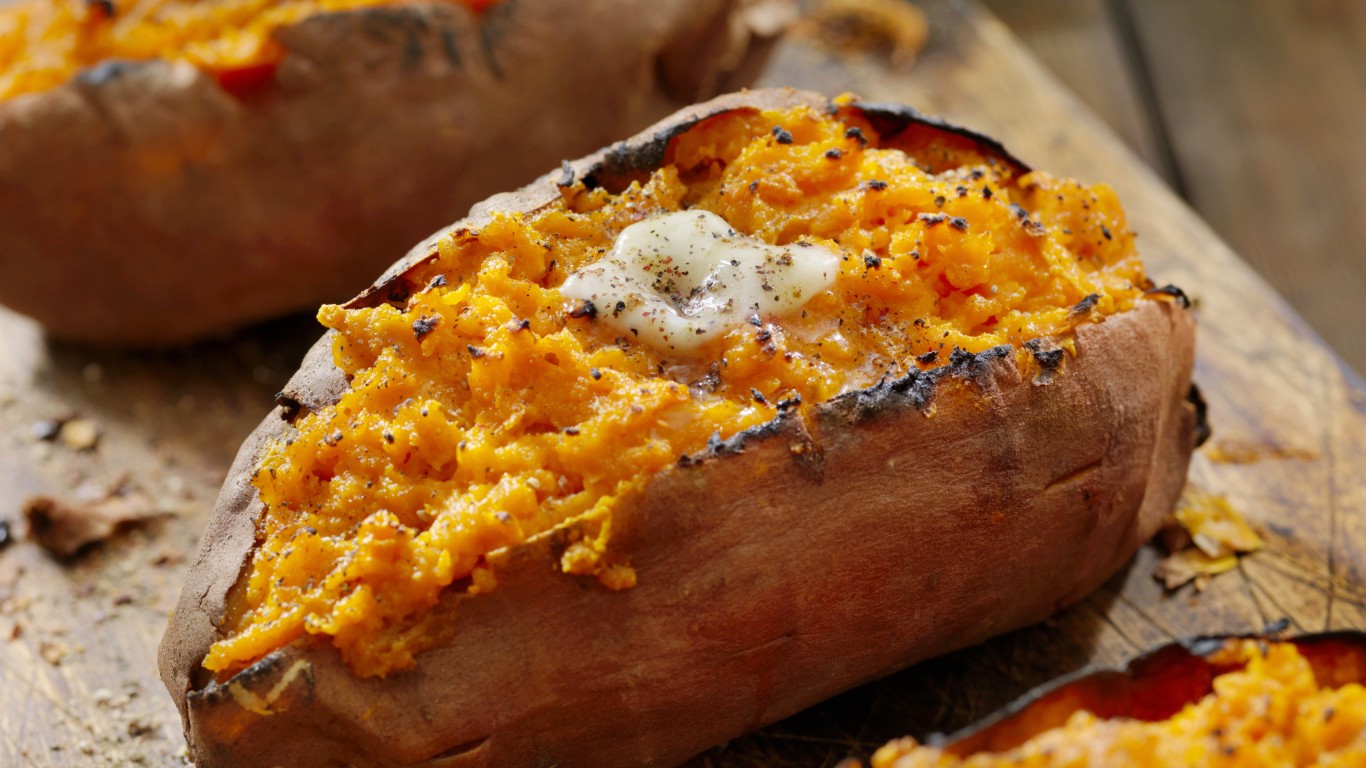
Sweet potato
> Helps fight or reduce the risk of: Type 2 diabetes
Looking for a healthier alternative to white potatoes? Try sweet potatoes. A boiled sweet potato has a low glycemic index, meaning it won’t spike your blood sugar levels if you have Type 2 diabetes. Sweet potatoes are a good source of starchy carbohydrates, which are better for Type 2 diabetes patients than processed carbs with added sugars. (However, it should be noted a 2013 study found no evidence sweet potatoes have any effect on Type 2 diabetes.)
[in-text-ad-2]
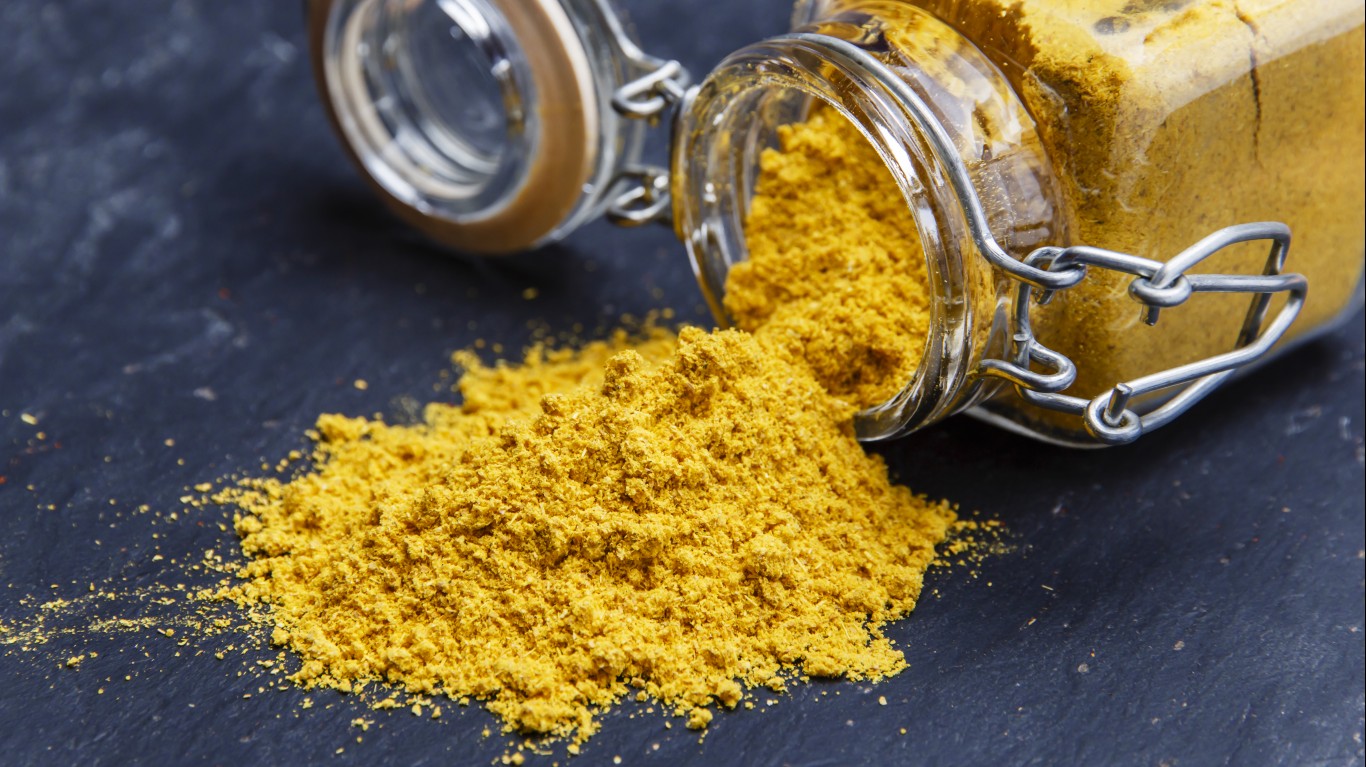
Turmeric
> Helps fight or reduce the risk of: Inflammation, arthritis
A spice used in many Asian dishes, turmeric offers nutritional benefits in addition to its taste. Turmeric contains curcumin, an anti-inflammatory that may help alleviate osteoarthritis and rheumatoid arthritis pain. Rheumatoid arthritis is an autoimmune disorder in which the body’s immune system attacks the joints, resulting in inflammation. Osteoarthritis is caused when the bones of the joints lose their cushioning cartilage, causing the bones to rub together. Yet it should be pointed out that studies on curcumin and arthritis are limited at this point in time.
The last few years made people forget how much banks and CD’s can pay. Meanwhile, interest rates have spiked and many can afford to pay you much more, but most are keeping yields low and hoping you won’t notice.
But there is good news. To win qualified customers, some accounts are paying almost 10x the national average! That’s an incredible way to keep your money safe and earn more at the same time. Our top pick for high yield savings accounts includes other benefits as well. You can earn up to 3.80% with a Checking & Savings Account today Sign up and get up to $300 with direct deposit. No account fees. FDIC Insured.
Click here to see how much more you could be earning on your savings today. It takes just a few minutes to open an account to make your money work for you.
Thank you for reading! Have some feedback for us?
Contact the 24/7 Wall St. editorial team.